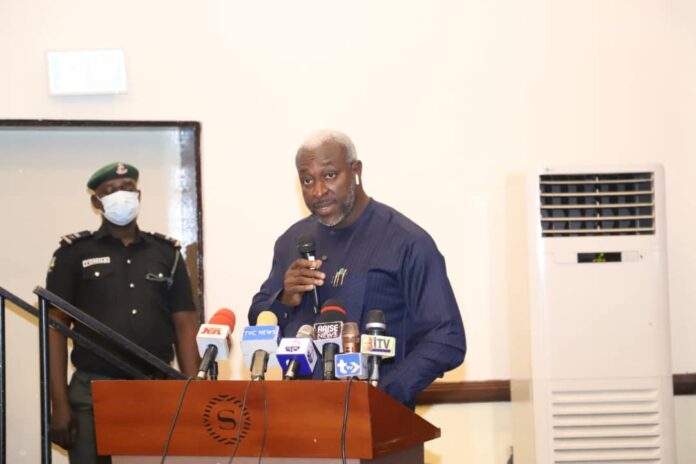
80% of child deaths are reported to be prevented annually when optimal breastfeeding is practiced. This was revealed by the Honourable Minister of State for Health, Hon. Joseph Ekumankama at the flag-off ceremony to commemorate the 2022 World Breastfeeding week, with the theme “Step up for Breastfeeding: Educate and Support”, held on Monday 1st August, 2022 in Abuja. The weeklong event is geared towards creating awarenes to generate support to improve breastfeeding practices for good health and wellbeing outcomes of infants, young children and mothers.
Hon. Ekumankama who represented the Honourable Minister of Health, Dr. Osagie Ehanire, said that the importance of breastfeeding cannot be overemphasized. It is the foundation of child survival, health, growth and development as well as provides every child with the best possible start in life. The global breastfeeding report highlights remarkable new evidence on health and economic benefits of breastfeeding; reiterating the importance as a fundamental driver in achieving Sustainable Development Goals (SDGs). The inadequate feeding practices and malnutrition which contributes to over 50% of under 5 children mortality with 2/3 of these deaths occurring in the first year of life closely related to poor breastfeeding practices.
According to the Minister, the Federal Ministry of Health (FMoH) remains committed to eradicating malnutrition from the country and improving our breastfeeding rate is a cost effective means towards achieving this. Our aim is to reach the 2025 World Health Assembly target of raising the rate of exclusive breastfeeding to at least 50%. We recommend early initiation of breastfeeding within one hour of birth, exclusive breastfeeding for the first six months of life, continued breastfeeding up to two years of age or beyond with the introduction of nutritionally adequate and safe complementary foods from six months.
Government through the FMoH will continue to invest in consistent training programmes for different levels of health professionals, doctors, nurses, midwives and community health workers. This is because health professionals play a critical role in supporting women to breastfeed and to do this effectively they need appropriate knowledge such as understanding the health outcomes associated with different methods of infant feeding and the physiological process of lactation, combined with positive, non-judgmental attitudes and effective communication and practical support skills. The Ministry through the National Agency for food and Drugs Administration and Control (NAFDAC) and other stakeholders will continue to enforce the Code for the marketing of Breast Milk Substitute (BMS) to address threats which wholesome marketing poses to optimal breastfeeding practice in Nigeria.
Earlier the Minister of Women Affairs., Dame Pauline Tallen, represented by the Director overseeing Women Development in the Ministry, Mrs. Christiana Oliko, said that Ministry of Women Affairs is poised to continuously promoting policies and practices while working with the FMoH and other stakeholders to raise awareness on the benefits of exclusive breastfeeding during the first six months of life, which is the most cost effective intervention for preventing child deaths. She called for the utilization of every available opportunity to reach out to family members, communities and religious leaders to share the importance of breastfeeding. “Institutions both public and private sector must be encouraged to ensure that breastfeeding corners and crèches are established to cater for the breastfeeding needs of working nursing mothers”.
Chairman House Committee on Health, Dr. Ibrahim Oloriegbe in his keynote address on Improving National Capacity to Promote, Protect and Support Breastfeeding in Nigeria said that, in order to attain adequate promotion of breastfeeding, there is need to work with the Ministry of Education to inculcate breastfeeding in our curriculum, particularly the junior and senior secondary schools as part of social and ethics subject. “We have to go back to the schools and introduce breastfeeding at the early lives of girls, to enable them know that breastfeeding is important and good for their health, so that they can practice when they start having children. It is important to catch them young which makes it easier to sustain the practice when they attain child bearing age”.
By: Blessing Efem
Signed: A.A.A Chindaya (Deputy Director Media & Public Relations Unit)
1st August, 2022






